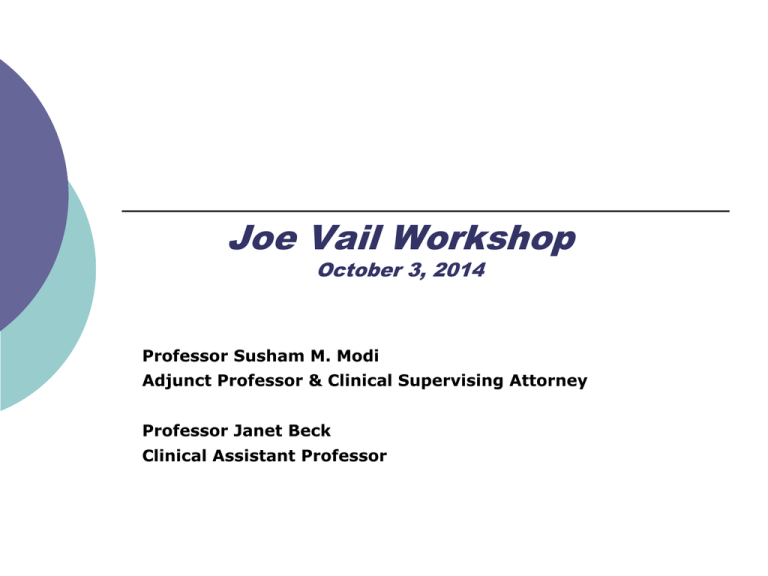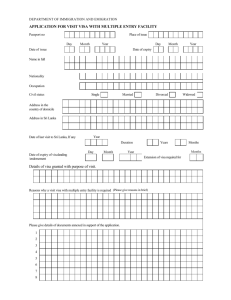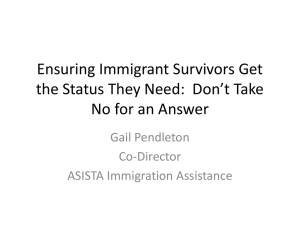Joe Vail Workshop October 3, 2014
advertisement

Joe Vail Workshop October 3, 2014 Professor Susham M. Modi Adjunct Professor & Clinical Supervising Attorney Professor Janet Beck Clinical Assistant Professor Overview - Violence Against Women Act (VAWA) - Victims of Crimes (U Visa) - Victims of Human Trafficking (T Visa) Violence Against Women Act (VAWA) Enacted in 1994 and amended in 1996, 2000, and 2006 Designed to help individuals who would normally be able to obtain permanent residence through family visa system, but cannot because of domestic violence Allows domestic violence survivor to file a “self-petition” without his/her abuser Many requirements relaxed for adjustment of status, including requirements regarding legal entry Men, women, and children can qualify WHAT DOES VAWA GIVE THE VICTIM? Deferred Action A Work Permit Permanent Residency VAWA: Requirements Who may qualify: Spouse or child of a U.S. citizen Spouse or child of permanent resident Parent of U.S. citizen Parent of an abused child Child over 21 under 25 years old if delay related to violence Child includes step-children and adopted children What must they show: Must prove that the U.S. citizen or permanent resident subjected spouse, child, or parent to abuse or extreme cruelty Good moral character Good faith marriage Cohabitation INA § 101(a)(15)(U) VAWA: USC/LPR Abuser Abuse could have occurred before abuser USC or LPR Can apply up to two years after abuser loses/renounces USC or LPR status Must be related to or due to incident of domestic violence VAWA: Marriage Issues Common law marriage accepted if recognized in jurisdiction Can petition within two years after divorce There must is a connection between the divorce and domestic violence Can petition within two years if abusive USC spouse dies Can petition even if marriage not valid due to bigamy/polygamy if self-petitioner believed marriage to be valid and marriage ceremony performed Self-petitioner cannot remarry before approval of the petition VAWA: Good faith marriage Must establish that marriage or intended marriage was entered into in good faith Must not be for the sole purpose of obtaining immigration benefits Most important factor is whether couple intended to establish a life together at the time of the marriage VAWA: Abuse issues 8 CFR § 204.2(c)(1)(vi) Definition of the abuse covered under the immigration regulations and guidance is flexible and broad enough to encompass physical, sexual, and psychological acts, as well as economic coercion. Even if there is no physical abuse, the abuse may rise to a certain level of severity to constitute battery or extreme cruelty VAWA: Residence issues Self-petitioner must have lived with the abuser No minimum length of time required Self-petitioner can live abroad if subjected to abuse by LPR/USC spouse in the US or LPR/USC spouse is a member of the US govt. or armed forces VAWA: Good moral character Good moral character must be demonstrated for the past three years INA § 101(f) lists bars to good moral character Special exception if an act/conviction is waivable and connected to the abuse VAWA: Derivatives VAWA applicant can include his/her children in VAWA self-petition as long as children are unmarried and under age 21 Children need not have been abused or be related to abuser If child turns 21 after filing or approval, their preference category will change but they will still be eligible for adjustment VAWA: Self-petitioning Children Child must be under age 21 and have a qualifying relationship with an USC/LPR parent Abuser must be child’s parent or step-parent or adopted parent; to be a step-parent under immigration law, parents must have married before child turned 18; adopted parent under the age of 16 Self-petitioner may file between 21 and under age 25 if they can show that abuse was a central reason for filing delay Child must show that she has been subjected to battery or extreme cruelty; witnessing abuse of mother often will itself be extreme cruelty Child must have resided with the abusive parent Child must show they are a person of good moral character Assumed if under 14 VAWA: Self-petitioning parents Abusive son/daughter must be over 21 and there must be a qualifying relationship Abuser is or was a USC USC son/daughter must have abused the parent Self-petitioner resided with the son/daughter Self-petitioner is a person of good moral character VAWA: Adjustment of Status May file concurrently if self-petitioner is an immediate relative or the priority date is current Otherwise the self-petitioner must wait until an immigrant visa becomes available Priority date Preference category Check visa bulletin issues by the Department of State VAWA: AOS Requirements Approved I-360 or derivative beneficiary Visa must be available Admissible under INA § 212 or eligible for a waiver For VAWA, several inadmissibility grounds do not apply I-864W (exemption to Affidavit of Support) VAWA: AOS Process File I-485 with supporting documentation With the Vermont Service Center if filing I-360 concurrently; Or with the Chicago Lockbox if filing subsequently Applicant may need to attend an interview If granted, LPR status is granted If applicant is in removal proceedings, must file AOS in Immigration Court VAWA: Consular processing If the self-petitioner or derivative beneficiary is not in the US or ineligible for AOS, that person will need to consular process Approved petition is sent to the National Visa Center National Visa Center collects fees, applications, and documents NVC will forward complete packet to the appropriate consulate Interview at the consulate Admitted at a Point of Entry as Lawful Permanent Resident Victims with Conditional Permanent Residence Conditional Residence is given to spouses who obtain LPR status based on marriage that occurred within two years of admission Must file joint petition to remove conditions Victims can apply for the removal of the condition alone without abuser Must show person was victim of battery or extreme cruelty Must show marriage was in good faith VAWA Cancellation of Removal Applicant must be in removal proceedings Persons eligible: Abused spouse of USC or LPR Abused son/daughter of USC or LPR Abused “intended spouse” of USC or LPR Non-abused parent of abused child of USC or LPR VAWA Cancellation: Requirements Victim of battery or extreme cruelty Physical presence in the US for three years Issuance of NTA does not stop accrual Extreme hardship to self, child, or parent upon return to home country Good moral character Not inadmissible or deportable under certain provisions Not been convicted of an aggravated felony VAWA Cancellation vs. VAWA Self-petition You do not have to prove good faith marriage or cohabitation Can apply even if divorced for more than 2 years Faster path to residence Best for short marriages 4,000 annual cap Derivatives cannot adjust but are eligible for parole Harder to get Judges not as educated Traumatic for the victim U nonimmigrant visa Available for victims of certain crimes and their family members Created by the Victims of Trafficking and Violence Prevention Act of 2000. Amended in 2005 and 2008 Enhances law enforcement’s ability to investigate and prosecute crimes Furthers humanitarian interests by protecting victims of serious crimes From 2000 until 2007, only U Interim Relief was available. U visa interim regulations became effective in 2007. U visa interim adjustment regulations became effective in 2009. U visa eligibility requirements Suffered substantial physical or mental abuse as a result of having been a victim of certain criminal activity Possess information concerning the criminal activity Has been helpful, is being helpful, or is likely to be helpful in the investigation or prosecution of the criminal activity Certification from federal, state, or local law enforcement authority Criminal activity violated laws of the US or occurred in the US U Visa: Included Crimes Trafficking, sexual exploitation, slave trade, peonage, involuntary servitude, rape, sexual assault, abusive sexual contact, incest, domestic violence, felonious assault, female genital mutilation, torture, hostage taking, kidnapping, false imprisonment, blackmail, extortion, abduction, manslaughter, murder, witness tampering, obstruction of justice, or perjury, attempt, conspiracy, or solicitation to commit any of the above-listed crimes, or any similar activity in violation of federal, state, or local criminal law INA 101(a)(15)(U) U visa: Victim Direct victim- person who has suffered direct harm or is directly/proximately harmed as a result of criminal activity Bystander witness- suffers unusually direct injury as a result of a qualifying crime Indirect victim- family members of victim of murder/manslaughter or is incompetent/incapacitated as a result of crime Spouse, unmarried children under 21, parents if victim is under 21, siblings if under 18 and victim under 21 Family members of USC victim may qualify U visa: Harm Physical or mental abuse Substantial factors Mental abuse- impairment of emotional or psychological soundness Nature of the injury Severity of perpetrator's conduct Severity of harm inflicted Duration of harm inflicted “Any credible evidence” standard U visa: Helpfulness Proof of help must be provided on Form I918 Supplement B No requirement that investigation led to prosecution Certification can come from Federal, State or local prosecutor, Federal or State judge, a police investigator, victim witness advocate within DA’s office, Child Protective Service, EEOC, Department of Labor, or others if they have a criminal investigative jurisdiction If under 16, helpfulness requirement can be satisfied by parent, guardian, or next friend U visa: Admissible Petitioner must be admissible or have the ground of inadmissibility waived U visa-specific waiver does exist May waive any ground of inadmissibility if it is in the public or national interest except for grounds applicable to perpetrators/participants of Nazi persecutions, genocide, acts of torture or extrajudicial killings U visa: Process Form I-918 (A is for derivatives) Form I-918 Supplement B Evidence to establish requirements Statement by petitioner I-192 for inadmissibility waiver I-765 (not needed for principal) Passport File with Vermont Service Center U visa: Derivatives Spouse Children (unmarried and under 21) If principal applicant is under 21, can include parents and siblings under 18 Derivatives do not need to have helped, show harm, or be present in the US U Visa: Benefits Work permit and permission to remain in the country for four years 10,000 annual cap Eligible to apply for adjustment of status (permanent residence) after three years The same applied to derivatives U visa: Adjustment of Status Special adjustment provision INA § 245(m); 8 CFR § 245.24(b) Requirements Granted and continues to hold U nonimmigrant status Continuous physical presence for three years Not inadmissible under INA § 212(a)(3)(E) Has not unreasonably refused to provide assistance in investigation or prosecution Presence in US justified on humanitarian grounds, to ensure family unity, or is in the public interest U visa: AOS Process No interview with USCIS Do not need to show they are admissible by overcoming grounds of inadmissibility USCIS has exclusive jurisdiction to adjudicate the AOS even if applicant is in removal proceedings For applicants with prior ORs, must reopen and then terminate proceedings File I-485 with required documentation with the Vermont Service Center U visa: Qualifying family members Upon approval of adjustment, USCIS can also adjust status of principal’s spouse, child, or parent who did not receive a U nonimmigrant visa in order to avoid extreme hardship Procedure Step 1: Principal applicant files a petition on behalf of the family member on Form I-929 Step 2: Family member adjusts status or goes through consular processing T Visa Visa available for victims of human trafficking Requirements: Subject to “severe trafficking” (the use of force, fraud, or coercion for sex trafficking and/or involuntary servitude, peonage, debt bondage, or slavery) Physical present in the US on account of trafficking Complied with reasonable requests from a law enforcement agency in the investigation and/or prosecution of the crimes Would suffer extreme hardship involving unusual and severe harm upon removal T Visa: Benefits Work permit and permission to remain in the country for four years under T nonimmigrant status Eligible to apply for adjustment of status (permanent residence) after three years Derivatives Spouse Child If under 21, can include parents and siblings under 18 The University of Houston is a Carnegie-designated Tier One public research university and an EEO/AA institution.



